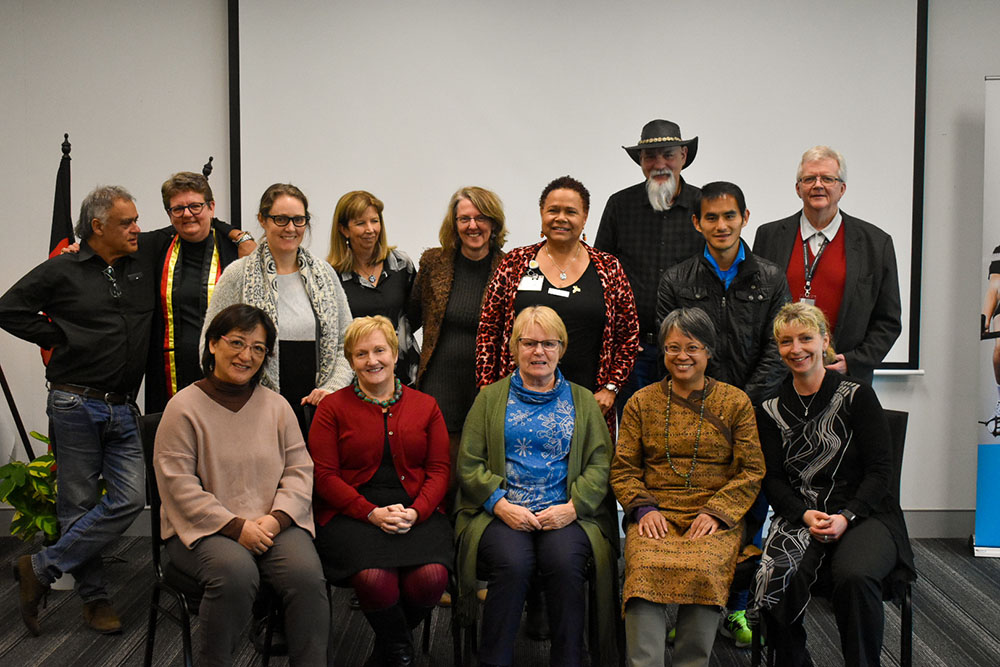Amy Stevenson
19 July 2019: The University of Canberra’s Collaborative Indigenous Research Initiative (CIRI) and Faculty of Health joined forces to bring together and showcase innovative research projects with Indigenous peoples in Taiwan and Australia.
After being welcomed to country by Ngunnawal UC Elder-In-Residence Aunty Ros Brown, Apu’u Kaaviana, an Indigenous Taiwanese grassroots organiser and representative of the Kanakanavu people in the Taiwanese Council of Indigenous Peoples, Associate Professor Chin-ju Lin from Kaohsiung Medical University and academics, students and community members from various faculties exchanged Indigenous knowledges and talked about the work they do with Indigenous peoples and communities.
The symposia included presentations, documentaries and yarning circles. The yarning circles, which were facilitated by Wayne Applebee, an Indigenous Elder and PhD student, provided an opportunity for participants to get to know each other at deeper levels and to explore in greater depth ways of reviving, strengthening and promoting Indigenous knowledges, and cultural and spiritual practices.
UC Assistant Professor in the Faculty of Health, Dr Petra Buergelt, who initiated and organised the event, said the symposia created a space for Indigenous and non-Indigenous representatives of both countries to connect and exchange on their projects.
This exchange emerged from an Indigenist participatory action research initiative that was initiated by Australian and Taiwanese Indigenous peoples at the end of 2017. The exchanges are co-created and co-implemented by an inter-disciplinary and inter-sectorial team consisting of Indigenous and non-Indigenous community members, academics and the Red Cross in Northern Australia and Taiwan.
“As part of this initiative we started connecting Indigenous communities in Taiwan and Australia to facilitate them exchanging their ecological-cultural Indigenous knowledges, cultural practices and experiences to contribute to healing and transforming the traumatic past and rebuilding their strength,” said Dr Buergelt.…
Dr Buergelt, who co-leads this initiative, said, “Humanity is increasingly experiencing disease, disasters and climate change challenges. Indigenous ecological and cultural knowledges practices centering around living in harmony with nature are the key to restoring health and wellbeing of all people holistically, reducing the risk of disasters and adapting to climate change.
“However, worldwide, Indigenous peoples are suffering large health inequalities and disadvantages as a result of historical and contemporary colonisation. For Indigenous peoples from different countries, and their non-Indigenous allies, uniting and working together two-way is critical for healing and strengthening both Indigenous and non-Indigenous peoples, which is, in turn, is the key to human survival and thriving.”
The representative from Kaohsiung Medical University, Associate Professor Lin, added that the symposia was also an opportunity to exchange knowledges about how universities can fulfil their social responsibilities towards Indigenous communities.
“We came here to also exchange experiences of how more Indigenous knowledges could be taught in universities and how universities could create a more culturally safe environment for Indigenous students and academics that enables them to succeed and to fully contribute their Indigenous knowledges,” Associate Professor Lin said.
Apuu Kaaviana emphasised, “The collaboration between Indigenous and non-Indigenous peoples are always challenging. In many cases, scholars came to our communities with their profession. I hope more and more scholars came to our communities with attitudes of respecting, understanding, and listening. We should work together as partners, rather than helpless victims who needed to be helped. We are still trying. I think this collaboration also represents our steps towards reconciliation between Indigenous and non-Indigenous people, communities and universities”.
The symposia participants realised the many similarities between Australian and Taiwan Indigenous knowledges, experiences and impacts of colonisation, and challenges and opportunities for learning from each other. The authentic exchange led to participants bonding, feeling strengthened and being inspired to work together, planting seeds for collaborating in terms of Indigenous research and education across both countries to contribute to turning the tide and restoring harmony, health and wellbeing.
The Office of Aboriginal and Torres Strait Islander Leadership and Strategy through the University of Canberra Collaborative Indigenous Research Initiative is proud to support international Indigenous collaborations such as this symposia. This event has been a great success with a coming together of Indigenous scholars from both Taiwan and Australia. Such exchange opportunities are highly valuable not only for sharing research and Indigenous knowledges, but also sharing culture and developing a better understanding of the social position of our respective Indigenous communities.



